My Cart
There is no product in your Cart
Tile size
Selecting the appropriate tile size for a space is not a simple task. It involves not just taking into account space available, but also the usage of the particular room. Tiles are available in a variety of sizes, for residential and commercial applications. The straightforward formula to get tile size right is to select a size that is proportionate to the size of the area you are covering. For example, if you are looking for tiles for an open space, like a large living room, it is best to opt for large format tiles. Similarly, for a medium sized space, such as a bedroom, you can opt for medium tiles, and maybe small tiles for a corridor or kitchen backsplashes. Keep the overall design scheme and aesthetic in mind while choosing the tile size for your space.
Selecting the appropriate tile size for a space is not a simple task. It involves not just taking into account space available, but also the usage of the particular room....
Items 0 of 0
Standard Tile Sizes
Most tiles are available in standard sizes. These sizes can vary from as small as 200 mm to as large as 2400 mm.
| Tiles |
Tile Sizes in Feet |
Tile Sizes in Inches |
Tile Sizes in mm |
|
Most Commonly Used Tiles |
1 x 1 feet 1 x 2 feet 1.5 x 1.5 feet 2 x 2 feet 5/6 x 1 1/4 feet 4 x 4 feet |
12 inches x 12 inches 12 inches x 24 inches 18 inches x 18 inches 24 inches x 24 inches 10 inches x 15 inches 48 inches x 48 inches |
300 mm x 300 mm 300 mm x 600 mm 450 mm x 450 mm 600 mm x 600 mm 250 mm x 375 mm 1200 mm x 1200 mm |
| Floor Tiles |
2 x 2 feet 2 x 4 feet 4 x 4 feet 4 x 8 feet 2 ½ x 5 feet |
24 x 24 inches 24 x 48 inches 48 x 48 inches 48 x 96 inches 31 x 62 inches |
600 x 600 mm 600 x 1200 mm 1200 x 1200 mm 1200 x 2400 mm 800 x 1600 mm |
| Wall Tiles |
2 x 4 feet 2 x 2 feet 1 x 2 feet 4 x 8 feet 4 x 4 feet |
24 x 48 inches 24 x 24 inches 12 x 24 inches 48 x 96 inches 48 x 48 inches |
600 x 1200 mm 600 x 600 mm 300 x 600 mm 1200 x 2400 mm 1200 x 1200 mm |
| Bathroom Tiles |
1 x 2 feet 1 x 1 feet 2 x 2 feet 1 x 1 1/2 feet 2 x 4 feet 2/3 x 1 feet |
12 x 24 inches 12 x 12 inches 24 x 24 inches 12 x 18 inches 24 x 48 inches 8 x 12 inches |
300 x 600 mm 300 x 300 mm 600 x 600 mm 300 x 450 mm 600 x 1200 mm 200 x 300 mm |
| Kitchen Tiles |
1 x 2 feet 2 x 2 feet 1 x 1 1/2 feet 1 x 1 feet 2 x 4 feet 2/3 x 1 feet 1 1/4 x 1 1/4 feet |
12 x 24 inches 24 x 24 inches 12 x 18 inches 12 x 12 inches 24 x 48 inches 8 x 12 inches 15 x 15 inches |
300 x 600 mm 600 x 600 mm 300 x 450 mm 300 x 300 mm 600 x 1200 mm 200 x 300 mm 395 x 395 mm |
| Living Room/Hall Tiles |
2 x 2 feet 2 1/2 x 4 feet 2 1/2 x 5 feet 2 x 4 feet 3 1/4 x 3 1/4 feet |
24 x 24 inches 31 x 48 inches 31 x 62 inches 24 x 48 inches 39 x 39 inches |
600 x 600 mm 800 x 1200 mm 800 x 1600 mm 600 x 1200 mm 1000 x 1000 mm |
| Outdoor Tiles |
2 x 2 feet 1 x 2 feet 2/3 x 2 feet 1 x 1 feet |
24 x 24 inches 24 x 48 inches 8 x 48 inches 12 x 12 inches |
600 x 600 mm 600 x 1200 mm 195 x 1200 mm 300 x 300 mm |
Most Common Tile Sizes in India
1x1 feet / 12x12 inches / 300x300 mm: This tile size is a standard square tile that can be used on floors as well as walls. These small tiles are the right size for use in a variety of spaces such as bathrooms, kitchens, bedrooms, etc.
1.5x1.5 feet / 18x18 inches / 450x450 mm: These square tiles are slightly larger and cover more area than the 1-foot tiles. These tiles are most commonly used in spaces such as offices, living rooms, and hallways.
2x2 feet / 24x24 inches/ 600x600 mm: These regular-sized tiles are some of the most commonly used tile sizes. They provide a larger surface area and reduced grout lines, providing a seamless look. These tiles are ideally used in spaces like living rooms, dining rooms, banquet halls, etc.
1x2 feet / 12x24 inches / 300x600 mm: These rectangular tiles are versatile and can be laid in several patterns to showcase their looks, such as herringbone or brick. These tiles can be used on accent walls or floors to make a space look much longer than it is.
Floor Tile Sizes:
Floor tiles are the base of your home and have a great impact on the look and feel of your space. These tiles are available in a variety of sizes, and the tile size you choose will depend upon the size of the space you are using them in, the overall design scheme, and your aesthetic.
The most commonly used floor tile sizes in India are:
- 2 x 2 feet / 24 x 24 inches /600 x 600 mm
- 2 x 4 feet / 24 x 48 inches / 600 x 1200 mm
- 4 x 4 feet / 48 x 48 inches / 1200 x 1200 mm
- 4 x 8 feet / 48 x 96 inches / 1200 x 2400 mm
- 2 ½ x 5 feet / 31 x 62 inches / 800 x 1600 mm
Wall Tile Sizes:
Wall tiles are also available in a large variety of sizes, and most, if not all, floor tiles can be used on the walls. Large-format wall tiles are often used in larger spaces, such as living rooms, mid-sized tiles are preferred for rooms such as bedrooms, while smaller mosaics are commonly used in shower areas and for backsplashes.
The most common wall tile sizes in India are:
- 2 x 4 feet / 24 x 48 inches / 600 x 1200 mm
- 2 x 2 feet / 24 x 24 inches / 600 x 600 mm
- 1 x 2 feet / 12 x 24 inches / 300 x 600 mm
- 4 x 8 feet / 48 x 96 inches / 1200 x 2400 mm
- 4 x 4 feet / 48 x 48 inches / 1200 x 1200 mm
Bathroom Tile Sizes:
The size of the bathrooms and the aesthetic requirement will decide the tile size. If you have a bigger bathroom, you may wish to divide your bathroom into three zones, namely wet, semi-dry, and dry and choose tiles for each zone. Smaller bathrooms can use accent tiles in the shower area to set it apart from the rest of the bathroom. You can use a mix of large and small tiles to create a functional and aesthetic bathroom.
The most common bathroom tiles size in India are
- 1 x 2 feet / 12 x 24 inches / 300 x 600 mm
- 1 x 1 feet / 12 x 12 inches / 300 x 300 mm
- 2 x 2 feet / 24 x 24 inches / 600 x 600 mm
- 1 x 1 1/2 feet / 12 x 18 inches / 300 x 450 mm
- 2 x 4 feet / 24 x 48 inches / 600 x 1200 mm
- 2/3 x 1 feet / 8 x 12 inches / 200 x 300 mm
Kitchen Tile Sizes:
Usually, in the kitchen, large format tiles are used on floors to give the kitchen a spacious look. On the walls, medium-sized ties are preferred since they can provide a larger surface area with minimal grout lines. Smaller tiles are often preferred for the backsplash and accent areas to accentuate the look and add visual depth.
The most common kitchen tile sizes in India are
- 1 x 2 feet / 12 x 24 inches / 300 x 600 mm
- 2 x 2 feet / 24 x 24 inches / 600 x 600 mm
- 1 x 1 1/2 feet / 12 x 18 inches / 300 x 450 mm
- 1 x 1 feet / 12 x 12 inches / 300 x 300 mm
- 2 x 4 feet / 24 x 48 inches / 600 x 1200 mm
Living Room or Hall Tile Sizes:
Since living rooms are often of an open format, large size tiles are often preferred, especially on the floor. These tiles provide an unbroken look that adds to the grandeur of the space. Smaller tiles are typically used to create intricate patterns or on accent walls to add visual depth to the space.
The most common living room or hall tile sizes in India are
- 2 x 2 feet / 24 x 24 inches / 600 x 600 mm
- 2 1/2 x 4 feet / 31 x 48 inches / 800 x 1200 mm
- 2 1/2 x 5 feet / 31 x 62 inches / 800 x 1600 mm
- 2 x 4 feet / 24 x 48 inches / 600 x 1200 mm
- 3 1/4 x 3 1/4 feet / 39 x 39 inches / 1000 x 1000 mm
Outdoor Tile Sizes:
Outdoor areas in India can be defined to be spaces such as patios, balconies, gazebos, pathways, decks, terraces, etc. 1 x 1 feet or 12 x 12 inch tiles are frequently used for outdoor areas, such as small gazebos, since the increased number of grout lines helps add traction and the intricate design can help enhance the look of the design. For more larger areas, such as patios or large terraces, larger tiles are preferred for a more proportionate and visually appealing look.
The most outdoor tile sizes in India are:
- 2 x 2 feet / 24 x 24 inches / 600 x 600 mm
- 1 x 2 feet / 24 x 48 inches / 600 x 1200 mm
- 2/3 x 2 feet / 8 x 48 inches / 195 x 1200 mm
- 1 x 1 feet / 12 x 12 inches / 300 x 300 mm
Tile Size Chart
Rectangular Tile Sizes
Rectangular tiles have two parallel long sides and two parallel short sides. These tiles can help you extend the length or breadth of a space, depending on how the tiles are placed. If placed vertically, they can make your room look taller. Similarly, if placed horizontally, the tiles can help your room look longer. Rectangular tiles can be installed in various layouts, such as brick, offset, herringbone, etc. and work well with minimalistic design schemes.
|
Tiles Type |
Tile Sizes in Feet |
Tile Sizes in Inches |
Tile Sizes in mm |
Usage/ Application |
|
¾ x 1 feet 5/6 x 1 ¼ feet |
8 x 12 inches 10 x 15 inches |
200 x 300 mm 250 x 375 mm |
These small rectangular tiles are the ideal choice to create intricate designs or accent areas in a variety of spaces, such as the backsplash in the kitchen or the shower area in the bathroom. | |
| Rectangular Tiles (Medium) | 1 x 1 ½ feet | 12 x 18 inches | 300 x 450 mm | The medium rectangular tiles can be used on both floors and walls and are most commonly used in medium sized spaces such as kitchens, bedrooms, living rooms, small offices, and corridors for a modern look. |
| Rectangular Tiles (Large) |
2 x 4 feet 2 ½ x 5 feet |
24 x 48 inches 31 x 62 inches |
600 x 1200 mm 800 x 1600 mm |
The large rectangular tiles are the perfect choice for open and expansive spaces, such as open plan homes, banquet halls, showrooms, lobby areas, etc. for an unbroken and grand look. |
| Subway Tiles |
3” x 4” 3” x 6” 3” x 8” 6” x 8” |
Classic and timeless, these tiles are a popular choice for creating elegant and clean looks in kitchens, bathrooms, and backsplashes. | ||
|
2 ½ x 5 feet ¾ x 4 feet ½ x 2 feet 1 x 2 feet |
31 x 94 inches 8 x 48 inches 6 x 24 inches 12 x 24 inches |
800 x 2400 mm 195 x 1200 mm 145 x 600 mm 300 x 1200 mm |
Plank tiles are usually imprinted with a wood like design and can be used to emulate the look of hardwood planks. These tiles can add a touch of warmth into spaces like bedrooms, living rooms, and outdoor spaces like terraces and patios. |
Square Tile Sizes
Square tiles can give any space a symmetrical look. This makes them the ideal choice for both contemporary and traditional design schemes. The classic look of square tiles can be effortlessly incorporated into a wide variety of design schemes on both floors and walls, making them a versatile choice.
| Tiles Type | Tile Sizes in Feet | Tile Sizes in Inches |
Tile Sizes in mm |
Typical Use |
|
Small Square |
0.02x 0.02 feet 0.04x 0.04 feet 0.08x 0.08 feet 0.16x 0.16 feet |
¼” x ¼” ½” x ½” 1” x 1” 2” x 2” |
6 x 6 mm 12 x 12 mm 25 x 25 mm 50 x 50 mm |
Small square tiles are so adaptable that they can be utilised as decorative outlines, on accent walls, or to provide a sense of elegance to smaller spaces like bathroom walls and kitchen backsplashes. |
|
Medium Square |
0.25 x 0.25 feet 0.33 x 0.33 feet 0.42 x 0.42 feet 0.5 x 0.5 feet |
3” x 3” 4” x 4” 5” x 5” 6” x 6” |
76.2 x 76.2 mm 100 x 100 mm 127 x 127 mm 150 x 150 mm |
Given their dynamic shape, medium square tiles work well for both floors and walls. For bedrooms or living rooms, they are the ideal method to evoke a traditional feel. |
|
Large Square |
0.67 x 0.67 feet 1 x 1 foot 1.33 x 1.33 feet 1.5 x 1.5 feet 1.67 x 1.67 feet 2 x 2 feet 4 x 4 feet |
8” x 8” 12” x 12” 16” x 16” 18” x 18” 20” x 20” 24” x 24” 48” x 48” |
200 x 200 mm 300 x 300 mm 400 x 400 mm 450 x 450 mm 500 x 500 mm 600 x 600 mm 1200 x 1200 mm |
Large square tiles are ideal for large open-plan spaces and even in commercial settings due to their seamless grandeur and ability to cover up large areas with ease. |
|
Mosaic Square |
0.08x 0.08 feet 0.16x 0.16 feet |
1” x 1” 2” x 2” |
25 x 25 mm 50 x 50 mm |
Mosaic square tiles are often utilised as shower bases, kitchen backsplashes, creative decorations, or to create eye-catching designs on both indoors and outdoor, and are designed to enhance spaces with their visual appeal and tactile depth. |
Custom Tile Sizes & Shapes
Individual creativity can be expressed through a multitude of design options made possible by custom tile sizes and shapes, which challenge conventional thinking. Accept the ability of custom tiles to turn every space into an unparalleled visual spectacle and a unique piece of art.
|
Tile Type |
Tile Sizes in Feet |
Tile Sizes in Inches |
Tile Sizes in mm |
Typical Use |
|
Hexagon and Octagon Tiles |
0.25 feet 0.33 feet 0.5 feet 0.67 feet 1 foot |
3" 4" 6" 8" 12" |
76 mm 100 mm 150 mm 200mm 300 mm |
These geometric style tiles provide a modern and sophisticated charm to interiors by acting as the backdrop for eye-catching patterns and layouts on the floors and walls. |
|
Star-and-Cross Tiles |
0.167 ft 0.25 ft 0.25 ft 0.5 ft 0.604 ft |
2" x 6" 3" x 3" 3" x 6" 6" x 6" 7 ¼” x 7 ¼” |
50 x 150 mm 76 x 76 mm 76 x 150 mm 150 x 150 mm 184 x 184 mm |
These tiles are distinguished by the way that stars and crosses intertwine, and are valuable for creating elaborate focal points. They can be used to decorate accent walls and entryways, adding a fascinating charm. |
|
Arabesque Tiles
|
0.17 feet 0.21 feet 0.21 feet 0.25 feet 0.42 feet 0.75 feet 0.92 feet |
2" x 2" 2 ½” x 2 ½” 2 ½” x 3" 3" x 3" 5" x 5" 9" x 11" 11" x 11" |
50 mm 63.5 x 63.5 mm 63.5 mm x 76.2 mm 76 x 76 mm 127 x 127 mm 228.6 mm x 279.4 mm 280 x 280 mm |
These attractive tiles feature appealing, flowing motifs that give accent walls, bathrooms, and kitchens a sense of refinement and an exotic, opulent feel. |
|
Scallop Tiles |
0.042 feet 0.0625 feet 0.0833 feet 0.1458 feet 0.1667 feet 0.5 feet 0.75 feet |
½” x ½” ¾” x ¾” 1" x 1" 1" x 1 ¾” 2" x 2" 6" x 7" 9" x 13" |
12.7 x 12.7 mm 19 x 19 mm 25 x 25 mm 25 x 44 mm 50 x 50 mm 150 x 180 mm 230 x330 mm |
Scallop tiles have charming scalloped edges that adds a whimsical and lively atmosphere to areas such as hallways, foyers, and backsplashes. Their distinct appeal gives the place character and visual interest, elevating it. |
How to Choose the Right Tile Size
While choosing the tile size for your space, here are some of the points you should keep in mind:
1. Size Of The Space:
It is important to consider the dimensions of the space while choosing the tiles for it. Large tiles can work well in both big and small spaces, while smaller tiles work best on smaller surfaces, such as backsplashes and accent walls.
2. Aesthetic And Overall Design:
Think about the overall look of the space you want. Larger tiles can provide you with a more contemporary and seamless look, while smaller tiles can give you a more intricate and traditional look.
3. Functionality Of The Space:
The functionality of the space will also have an impact on the tile size you pick. For example, in areas that see high traffic, larger tiles are preferable since the lower number of grout lines makes it easier to clean them. Similarly, moisture prone areas do well with smaller tiles with more grout lines, since the increased number of grout lines can provide better traction.
4. Visual Balance:
To ensure there is a visual balance in the space, it is best to make sure that the tile size works well with not just the dimensions of the space, but also with the other elements present in the space. For example, if you opt for way too large tiles in a small bathroom, they may overwhelm the space. Similarly, smaller tiles in a large, expansive space may make the space look too cluttered.
5. Personal Choice:
This is the most important aspect of tile selection. Each space is a reflection of ourselves, especially in our homes, so it is best to choose tiles that reflect your personality. Opt for a tile size that works for you – if you like intricate designs, opt for a small tile size, even if you are going to install them in a larger space.
6. Material Of The Tile:
Each different material comes with its own strengths and weaknesses, especially when you consider the size of the tile. Keep these strengths and weaknesses in mind while considering a tile size for a particular area or space.
7. Visualise The Tiles:
Use visualisation tools and tile samples to see how different tile sizes will work in your space. This can help make the process of tile selection a lot easier.
Keep these 7 points in mind while looking for tiles, and make sure you strike a balance between aesthetic and functionality while selecting the right tile size for your space.
Tile Size Measurements: Square Feet, Square Metres, and Inches
The tile sizes are often expressed in terms like square feet, square inches, square metres. Square metres and square feet are frequently used to indicate the area to be covered by tiles, while square inches are often used to represent the measurements of the tiles themselves.
Tile Sizes and Coverage Areas
It is important to understand how you can relate the measurement of the tile and the area it can cover. This is to ensure effective planning and an accurate estimate of the number of tiles that will be required to cover a particular space.
Below is a table that showcases the various tile sizes and the area they will cover in square feet and square metres.
|
Tile Size (in inches) |
Coverage Area per Tile (in sq. ft.) |
Coverage Area per Tile (in square metres) |
|
12” x 12” |
1 |
0.093 |
|
18” x 18” |
2.25 |
0.209 |
|
12” x 24” |
2 |
0.186 |
|
24” x 24” |
4 |
0.372 |
|
6” x 6” |
0.25 |
0.023 |
|
8” x 8” |
0.44 |
0.041 |
|
12” x 72” |
3 |
0.278 |
|
4” x 12” |
0.33 |
0.031 |
Pros and Cons of Using Larger or Smaller Tiles
Pros of Using Larger Tiles:
1. Less Number Of Grout Lines
Large tiles cover a larger surface area, reducing the number of grout lines in the space. This creates a seamless and unbroken look that makes the space appear larger. It also has the added advantage of making cleaning a lot easier.
2. Contemporary Look
Large tiles are typically considered to be a part of modern designs. Most modern designs have a sleek look that large tiles can enhance by providing a seamless and spacious look. These tiles are ideal for spaces with minimalistic designs or open-plan spaces.
3. Cost and Time Efficiency
It is simple maths; larger tiles cover a larger area, so there is a lower number of tiles required to cover said area. The lower the number of tiles, the less is your time spent on installation, and it also results in a lower material cost.
Cons of Using Larger Tiles:
1. Lower Design Flexibility
It is difficult to create an intricate or complicated pattern using large tiles. You can use them as is for simple designs, but for a more complicated and intricate look, you will have to opt for smaller tiles.
2. Challenges During Installation:
Since larger tiles are larger they often weigh significantly more, making the handling and installation of these tiles challenging. You need to ensure that the surface is perfectly prepped and levelled before installing these tiles since inconsistencies in the level of the surface can cause the tile to crack.
Pros of Using Smaller Tiles:
1. Versatility of Design:
There is a greater versatility when it comes to design while using smaller tiles. You can indulge in creative and intricate layouts quite effortlessly. Smaller tiles offer you the freedom to experiment and add your personality to your space.
2. Easy to Install:
Generally speaking, smaller tiles are easier to handle and install due to their smaller size. It is also easy to manoeuvre and place them in tight spaces and irregular corners, as there is more flexibility during installation.
3. Repairing and Replacing:
If the tile gets damaged or is worn down, it is easier and much more cost-effective to replace small tiles than it is to replace larger tiles.
Cons of Using Smaller Tiles:
1. Increased Number Of Grout Lines:
Smaller tiles cover a smaller surface area and overall there is a larger number of grout lines. These grout lines can make cleaning and maintenance a difficult task. The increased number of grout lines can also impact the aesthetic, as they can make the space feel more visually cluttered and small.
2. Increased Installation Cost And Time:
To cover an area, you need a larger number of smaller tiles, increasing installation time and also the cost of materials required.
How Different Materials Influence Tile Size Choices
As mentioned before, the material of the tile also has an impact on the size of the tile you choose. Here is how the tile size is affected by different materials:
Vitrified Tiles:
Vitrified tiles are manufactured through the process of vitrification and are very strong and durable. They are available in all kinds of sizes, ranging from small to medium to large, and are available in a variety of designs and colours. Larger vitrified tiles are preferred for a seamless look that creates the illusion of spaciousness, smaller vitrified tiles are often used for a more intricate look.
Ceramic Tiles:
Ceramic tiles are manufactured by firing clay and other ingredients in a kiln at a high temperature. They are some of the most commonly used tiles and are quite cost-effective. They are also available in a large number of sizes, ranging from small to big, and are available in a large number of different designs and colours. Smaller ceramic tiles are ideal for creating intricate designs and spaces that have slopes or curves, while large ceramic tiles can be used to create a spacious look.
Porcelain Tiles:
Porcelain tiles are very similar to ceramic tiles, just that they are fired at even higher temperatures, making them much more strong and resistant to water. These tiles too are available in all kinds of sizes and various designs and colours. Small porcelain tiles are often used on accent walls and backsplashes for an intricate look, while larger porcelain tiles are used to create seamless and grand looks.
Tiles Size FAQs
- 1. Are there standard tile sizes available, or can I get tiles custom-made to my preferred dimensions?
- Orientbell Tiles produces a large range of tiles in various standard sizes. We do not offer custom-made tile sizes.
- 2. What are the benefits of using larger tiles versus smaller tiles?
- Since with larger tiles you have fewer grout lines the space is easier to clean and since it gives a seamless look, it creates an illusion of more space.
- 3. Can I mix different tile sizes within the same space for a unique design?
- Yes, different tile sizes are frequently mixed and matched to add visual interest to the space and to create a unique and personalised look.
- 4. What is the recommended tile size for a kitchen backsplash?
- It is preferred to use space-appropriate tiles in a space. Since the backsplash is usually 3 feet high, it makes sense to use small or medium-sized tiles for a more intricate look that adds visual depth to the space.
- 5. How do I choose between square and rectangular tiles for my living room?
- Both square and rectangle tiles have different aesthetics to offer. Square tiles can give the space a very traditional and symmetrical look, while rectangular tiles can give your space a more modern and elongated look. So, depending on your style and design for the space, you can select the tile shape.
- 6. Should wall and floor tiles be the same size?
- While most traditional schools of thought agree that wall tiles and floor tiles must complement each other and wall tiles should not be bigger than floor tiles, a lot of modern designers are opting for small floor tiles and large wall tiles for a unique look.
- 7. What size tile is best for a small bathroom?
- Large tiles can be used in small bathrooms for a seamless and spacious look, while smaller tiles can be used in the shower area for a more condensed look that adds an anti-slip function to the space.
- 8. What tiles skirting size is most common?
- The standard skirting size ranges between 100 mm to 150 mm depending upon the functionality of the space – whether it is residential or commercial
- 9. What benefits do mosaic tiles offer over tiles of a standard size?
- Mosaic tiles' range of colours and patterns gives them a distinctive appearance. Your room will appear even more enticing and aesthetically pleasant if you use mosaic tiles to create intriguing patterns and motifs.
- 10. Can we find tiles with unconventional shapes or sizes for a distinctive appearance?
- While mosaic tiles are available in different sizes, they are currently not available in unique and eclectic shapes. But you can always use different-sized tiles together to create unique shapes and patterns.
- 11. How to calculate tile size?
- Each tile page on the Orientbell Tiles website has an elaborate section on the details of its dimensions for the ease of customers.
- 12. What dimensions do border tiles have?
- Border tiles are available in a variety of dimensions, including 250x375 mm, and 200x1200 mm.




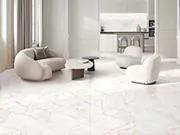
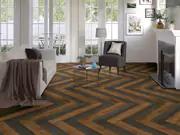

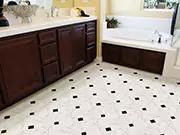

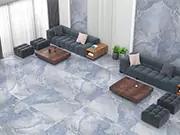
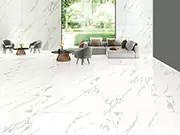
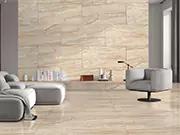
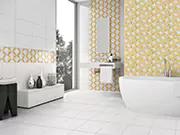


 DOWNLOAD CATALOGUE
DOWNLOAD CATALOGUE